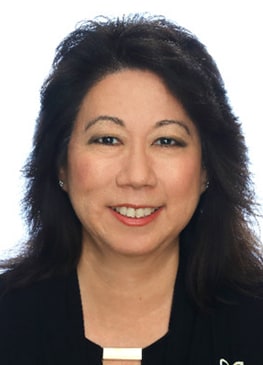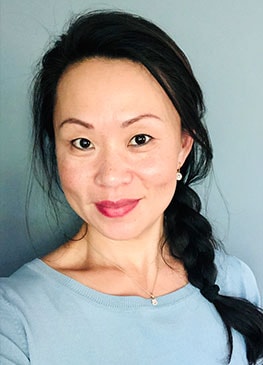Read the full interview here
-

Q. What were important influences that shaped who you are as a leader today?
A. My early influences started at my mother’s kitchen table. I grew up in the UAE, and my mother worked for a money exchange center where she became the first woman to lead a branch. She had the responsibility for growing and running the company’s busiest branch. But she was never meaningfully promoted beyond that particular level, while her male counterparts all around her were promoted.
Every time I think about her story, it drives my resolve to be a part of this movement to continue to lead and create professional opportunities for women and people of color. In a different world, my mother would have been a C-suite leader.
My mother’s story reaffirmed for me that women deserve limitless opportunities. And this starts with fostering continuous conversations about what people can do not only to remove limitations but also to create limitless opportunities for others.
-

Q. What have you done to make sure that you don’t feel like there is a ceiling above your head?
A. There’s a bit of my past, my present, and my future coming together. When I look at the limitations on my mother, I look at myself, and I look at my daughter who is coming into the workforce, I recognize there’s a long way for her to go, and we have to create equal opportunities for women and women of color in the workplace.
I’m in technology, and I’m super passionate about it. Women make up about 28 percent of the technology workforce, and there are certainly not enough women in tech who are in leadership positions, which brings me to the present.
As a woman leader in technology, I see it as my responsibility to step up and to influence and effect change wherever I can. It’s kind of like Spiderman — with great power comes great responsibility. I want to leverage my success to ensure that I elevate others like me by providing mentoring, connecting women with opportunities, and fostering an environment of inclusiveness.
-

Q. Did you have a lot of conversations with your mother about her frustrations and about how to get ahead in business?
A. The main conversation we had was about having strong allies. I’ve had some very tough professional situations, and I was able to stand up and continue to succeed because of the support of my leaders and others around me. I had the courage to stand up for myself, but I also needed the support of allies. You can’t do it alone.
I learned from my mother the importance of building a relationship map. You document your short-term and long-term career goals, and then you create a simple spreadsheet where you list all the people you could intentionally network with because they can be your allies in achieving these goals. And then you invest time and effort in building these relationships because relationships are a two-way street.
The other strategy that my mom taught me was to focus on what you can control. You have to define and recognize your own value. Don’t let others define it for you. My mom faced a lot of challenges, but she didn’t let them impact her. The lesson for me is to demand what you deserve.
And that also means ignoring some bad lessons from the past, when women are told, “you can’t do this”, “don’t rock the boat”, “be grateful”. You have to reframe your narrative and be your own cheerleader. One thing I do – it’s kind of corny – is to look at myself in the mirror for ten seconds each morning and then just high-five myself and say that I’m proud of how much I’ve accomplished.
-

Q. Can you talk more about headwinds you’ve encountered?
A. I’ve faced headwinds in my career not only as a woman, but also as an Asian woman. I’ll share two stories with you.
One was when I got promoted as a leader a couple of years ago at a previous firm, and I had different reactions from the men on my team.
One of them, let’s call him Refuser, told me that I am not qualified to lead and he refused to work for me.
The second one, on the same team, was the Berater. I was constantly berated by this man for being a woman leader.
And then the third person, again on the same team, let’s call him the Patronizer, said to me, “Congrats. I’m so proud of you.”
And these are people who report to me.
I do see a bamboo ceiling. There have been numerous times in my career when I’ve been asked to take on leadership responsibilities but without the title or the pay of male peers with similar or fewer skills.
-

Q. How do you deal with those situations?
A. This is why I talked earlier about the importance of having strong allies to help. You need that support from your leadership to be able to have those tough conversations. And you have to have those tough conversations not only for yourself but for the people who come after you.
For me, it was about taking them aside and really having them talk about why they’re saying the things that they’re saying. Why are they acting the way that they’re acting? And really letting them know that this is not acceptable.
-

Q. Other important lessons you’ve learned over your career?
A. One of them is to accept that perfect timing doesn’t exist. You need to keep an open mind to the possibilities, and sometimes the doors are opened for you and sometimes you have to grab that opportunity. The second thing I would say is that you should own your accomplishments and don’t personalize failures.
It’s important that we communicate our worth and champion our contribution in a way that doesn’t sound like an ego trip. It can be a little bit awkward to take credit for accomplishments, but if you don’t, you miss the opportunities that could open doors for you.
It also important to give yourself permission to fail the same way that you give yourself permission to excel. I failed miserably in my first job as a leader, and I was going to get fired. I was extremely devastated, and I never thought that I would be a successful leader. And here I am today, years later, as a leader in technology at Northwestern Mutual, which is a Fortune 90 company.
One of my big life lessons is that we can’t let a single incident color our view of ourselves. We need to focus on what we can do and not what we can’t do, and we have to bounce back. Failure is not irreversible, especially if you give yourself permission to fail.
-

Q. What do you think is the hardest part of leadership?
A. The hardest part of leadership – in addition to making sure that you hold your team accountable for the output – is, how do you humanize yourself? How do you become that leader who is empathetic, who really shows the team that you care?
I mentor a lot of people, and as leaders, we are often giving and giving. Sometimes you also need to make sure that you are taking care of yourself…make self-care an important part of your routine.
When someone asks me how they can balance everything in their busy lives, my advice is to let some things go. As women, we often try to be perfect. It’s not possible to do everything, so let some things go and get all the support that you can.







